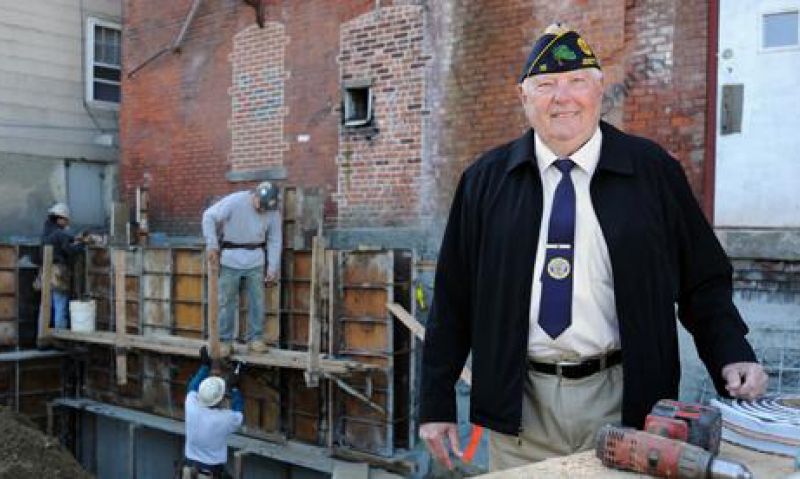
Legionnaires in Jewett City, Conn., are behind a multimillion dollar housing complex that could revolutionize the fight against veteran homelessness.
Legionnaires in Jewett City, Conn., are manning the front lines in the fight against veteran homelessness.
In the quaint eastern Connecticut town, members of LaFlamme-Kusek Post 15 are the driving force behind American Legion Veterans Housing Inc., an ambitious program that will give free housing to former military members who have fallen on hard times. The $5.2-million project will create 18 apartments for veterans using the upstairs of the post building and the adjacent property, where a four-floor housing unit is being constructed.
Advocates say the residential complex could become a national model for fighting veteran homelessness.
"When I started this, I said, ‘Well, it's a shot in the dark.' But right now, we're under construction," says Bill Czmyr, project president and longtime Legionnaire. "I never dreamed this was going to happen."
The initiative's beginnings are as grassroots as its goals. A reputed member of Post 15, Czmyr was often asked around town what he and fellow Legionnaires planned to do with the two vacated floors on top of their post building. In 2003, he told someone on a whim that they'd look into converting the space into apartments for veterans.
His seemingly flippant idea gradually picked up momentum, as he got estimates from local contractors for construction costs and assembled a makeshift fundraising crew filled with locals willing to volunteer their time and expertise. They filed for official nonprofit status and began meeting weekly, officially as American Legion Veterans Housing Inc.
"No one ever told me I was crazy, no one ever told me to get out of here," Czmyr says. "They just said, when you get enough people to have a meeting, let us know."
The project eventually drew the attention of Rep. Joe Courtney (D-Conn.) Officials from his office were sent to inspect the post building and assess Czmyr's plans. Approving of the project, Courtney signed off on a $200,000 federal earmark to it.
Soon, other donations began rolling in. The Connecticut Housing Finance and Authority committed $3.8 million and the state Department of Community and Economic Development pledged $500,000.
An idea hatched from small talk between townspeople became, over an eight-year period, a massive, multimillion dollar endeavor that has drawn the attention of government officials and experts in the field of homeless advocacy.
"We're under construction now," Czmyr says. "I get emotional when I talk about it."
The residential complex will house veterans on a permanent, not a temporary basis, making it unique to other projects of its kind. Traditionally, veterans have only been allowed a two-year stay in the low-income housing projects the VA has thrown its support behind.
Plans are different, however, in Jewett City. Veterans of all types - male and female servicemembers and their families - can live in the apartments indefinitely because VA is footing the $875 upkeep bill, using the veterans' housing stipends.
"It's going to maintain the apartment, a small fraction will go to the veteran for personal needs," Czmyr says.
Czmyr's work is still far from done. The fundraising isn't over for him and his cohorts, who meet weekly in a makeshift headquarters along the town's main strip.
When they founded it, members of the American Legion Veterans Housing Inc. hoped to raise $760,000 to cover incidentals for each apartment. So far, they've reached about $380,000 in donations from businesses and individual contributors.
"I'd like to see each veteran in the nation donate just $1," Czmyr says. "I'm not asking for $20 or $100... That's all we're looking for. This is veterans helping veterans."
Donations can be pledged through the group's website: http://talvhi.community.officelive.com/Donations.aspx.
Construction began on the project during the spring. Currently, the original post is being revamped and the foundations of the new building are being set. The complex hopes to open its doors to residents in the first quarter of next year.
"They are sandblasting the exterior of the original building and reframing it," says Avery Tillinghast, fundraising chief for the fundraising organization. "In a week or two they are taking down the old roof and putting a new one on."
Seeing its completion and success has taken on great personal meaning for Czmyr, who empathizes deeply with anyone who spends a night outdoors without a roof over their head.
"I grew up on a farm where, when the woodstove went out, it was just as cold inside as it was outside," he says. "And I said, ‘People who are living out there have to be freezing.' I just knew that if there was an opportunity to help them, I was going to accomplish that."
- Homeless Veterans

